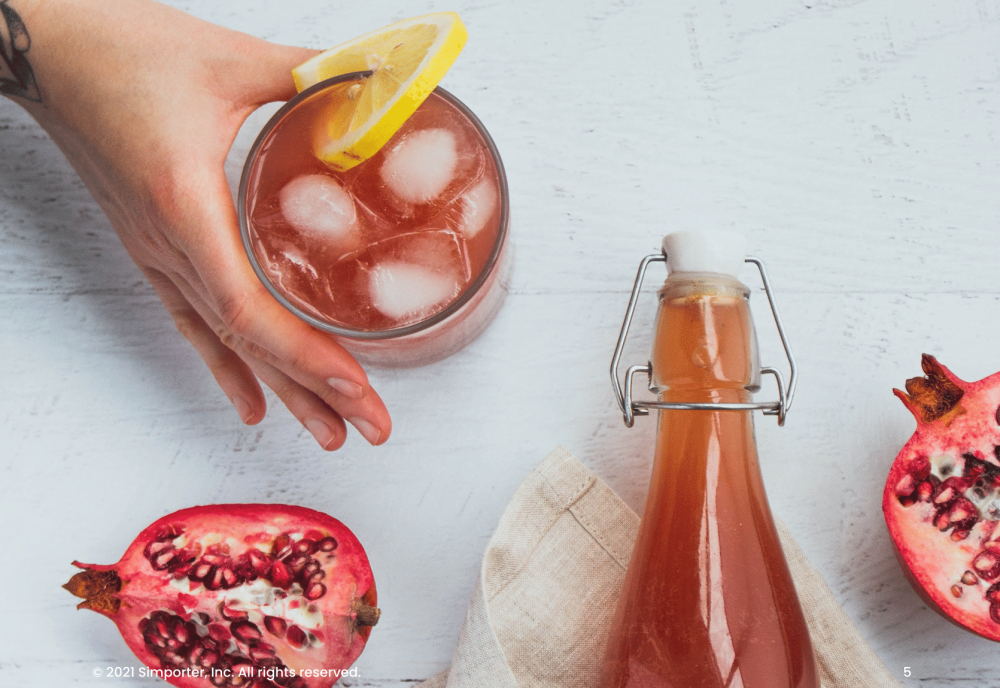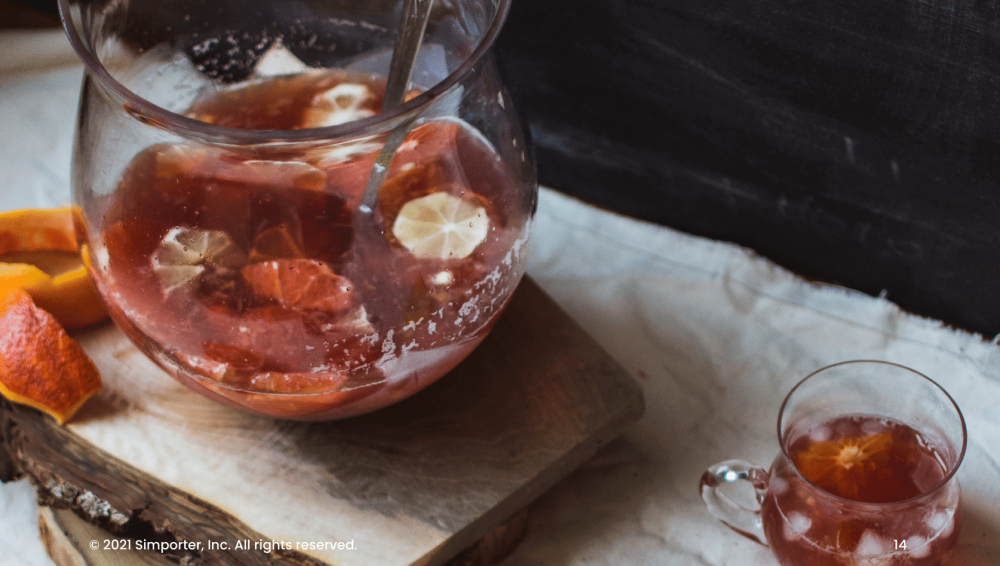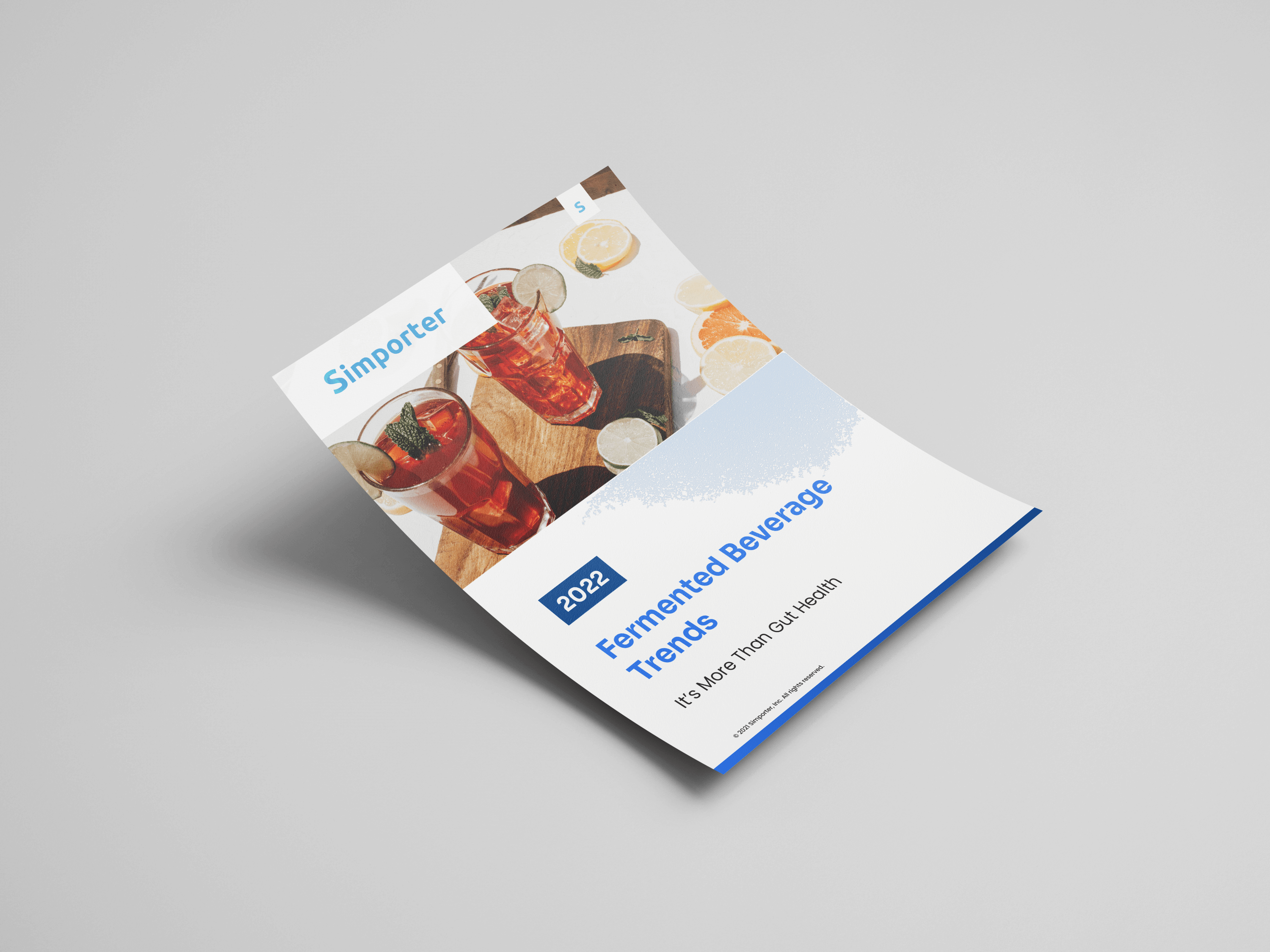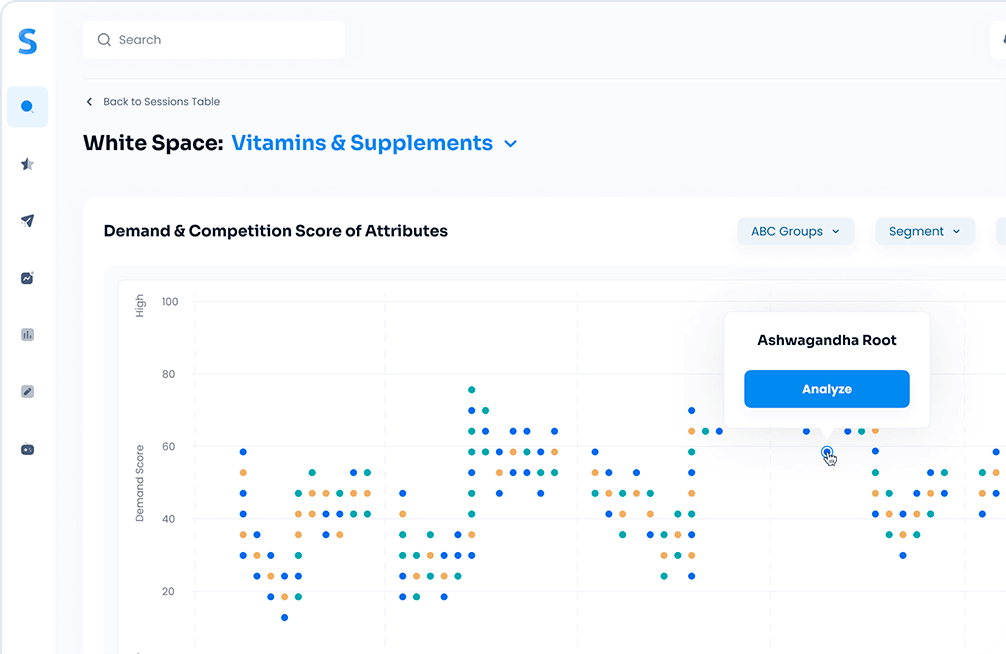Introduction
Fermented drinks are a rapidly growing trend in the beverage industry. The rise of many fermented beverages such as kombucha, kefir, and ginger beer is due to its range of health benefits, which include improved gut health, increased energy levels, and better digestion.
While there are many different types of fermented beverages in the market, we wanted to look at what drinks will be trending in the year to come and what will be driving these trends. In this white paper, we explore two significant trends:
- Consumers are focused on health, health, and more health. Consumers want highly functional beverages from gut health to joint health to immunity health and additional vitamins. The good thing is that fermented drinks can deliver.
- Kombucha is naturally loved by vegans and people with gluten intolerance because it is inherently plant-based and gluten-free. But, the fermented beverage is also getting love from a surprising group: athletes.
Data Analyzed for this Report
We used our WhiteSpace AI platform to collect and analyze over 2,200 products, 1.7 million mentions, and 528 brands for this report. We analyzed consumer interest for every relevant keyword phrase across tens of thousands of reviews, descriptions, Google search results, and consumer mentions on social media.
We then scored the level of consumer interest for each keyword phrase by cross-analyzing:
- Search frequency
- The volume of social media posts
- Sentiment
- Mentions
- Competition
This tool captures white spaces around ingredients, need states, and sensory attributes in a category in real-time. It helps identify which attributes consumers search for but cannot find so companies can include them in their development pipeline.
We aggregate this data to develop a “Mentions” market share rate to measure how much share an attribute holds compared to all other search terms. The “Mentions Growth” rate is a year-over-year rate that shows how much the term has grown or declined yearly across channels.
Each keyword phrase was scored by its competitive levels and consumer need state. Scores are categorized based on opportunity, known as the “opportunity score.” We rate attributes such as benefits, ingredients, and types of snacks from Very Low to Low, Average, High, to Very High.
What are Fermented Drinks?
Fermented drinks are typically made from fruit juices, herbal infusions, soaked grains, or green and black tea that has been allowed to culture or ferment for some time. These drinks tend to be good sources of probiotics.
Fermented beverages have been around for centuries and have become increasingly popular in recent years as consumers are seeking out new ways to take in more probiotics and natural ingredients. Examples of fermented beverages include kombucha, kefir, and ginger drinks.
Fermented drinks are considered functional beverages, which are drinks that convey more benefits than providing hydration alone.

Why the Growing Demand for Fermented Beverages?
Fermented drinks are becoming popular in the market for their wide range of health benefits. Drinks like kombucha contain live and active cultures and essential vitamins, minerals, amino acids, and enzymes. Fermented beverages also provide valuable amounts of B-vitamins, which are known to aid in immunity.
Consumers look to fermented drinks for a combination of reasons, including:
- Gut health. Fermented foods are rich in probiotic bacteria, so by consuming fermented foods, we add beneficial bacteria and enzymes to our overall intestinal flora, increasing the health of our gut microbiome and digestive system.
- Digestion Aid. Fermented drinks can make milk and cheese easier to digest because the fermentation process breaks down the sugars and starches in lactose into more easily digestible forms.
- Immunity. A large portion of our immune systems is housed in our guts. By consuming probiotic-rich beverages and foods, we support the gut lining and provide nutrients essential to a robust immune system.

Ingredients, Benefits, and Consumer Types: Choose Your Own Winning Combination
The fermented ingredients market is expected to grow from USD 23.1 billion in 2017 to USD 35.6 billion by 2022 at a CAGR of 9.0%
With so much at stake, Simporter decided to look at 72,000 consumer data points to score fermented beverage attributes across search terms, social mentions, reviews, and a host of more data.
We discovered the following trends and opportunities for ingredients, benefits, and psychographics based on our data.
Top Ingredients
Consumers are on the lookout for unique, natural ingredients. We found that ingredients like kiwi, spearmint leaves, turmeric, and ginger scored very high on our opportunity scale. Whereas ingredients like the lavender flower, rose petals, and rooibos scored low.
Here are five top ingredients for the fermented beverage category:
- Kiwi held a .23 percent share of total mention share but had a 180 percent growth rate year-over-year in mentions
- Spearmint leaves held a 1.93 percent share of mentions and a 167 growth rate in mentions
- Turmeric held a .78 percent share of mentions with a 100 percent growth rate in mentions
- Ginger had a 12.35 percent share of mentions with a 73 percent growth rate
- Green tea leaf had a 38.44 percent share of mentions with a 48 percent growth rate in mentions
Lavender experienced a dip of 49 percent in mentions, and rose petals experienced a decrease of 70 percent.
Top Benefits
We found that consumers look for several benefits out of their fermented beverages as well. For year-over-year growth in mentions:
- Vitamins and minerals as a benefit group saw a 67 percent increase
- Gut health saw an increase of 56 percent
- Hydration saw an increase of 46 percent
- Immunity saw an increase of 40 percent
The skincare benefit decreased in mentions by 5 percent, and the prebiotic benefit decreased by 72 percent.
Top Psychographics
Fermented beverages are in high demand by females who held a 55% share of total mentions. But interest from males is growing, by 24 percent.
Here are the primary growth areas for other psychographic groups that most search for and mention fermented beverages:
- Gluten-free dieters, at 183 percent growth in mentions
- Vegans, at 118 percent growth in mentions
- Athletes, at 14% percent growth in mentions
Keto dieters decreased their mentions of fermented beverages by 22 percent, whereas runners decreased by 24 percent, travelers decreased by 41 percent, and people who do yoga decreased by 100 percent.
Why Ginger, Green Tea, and Spearmint are a Fermented Drink’s Best Friends
Ginger
Ginger and a fermented drink make a perfect pair due to their powerhouse of gut-boosting benefits.
One of the most well-known benefits of ginger is aiding in digestion, which does so through the production of more saliva and stomach juices. The high liquid helps relax the stomach and intestines, which reduces nausea and aids in digestion.
Green Tea Leaf
Consumers look to green tea because it is an excellent source of antioxidants. It contains polyphenols and catechins, powerful antioxidants that help prevent cell damage by neutralizing free radicals. Green tea also helps in weight loss due to its high metabolism-boosting properties.
Spearmint Leaves
The most important health benefits of spearmint include improving digestion, boosting respiratory health, optimizing hormonal levels, relieving stress, and increasing circulation.
In terms of a fermented drink ingredient, spearmint offers a smoother taste than peppermint. The essential oil form has antifungal properties, which are linked to relieving digestive problems’ symptoms by relaxing stomach muscles. So by pairing the digestive relief of spearmint with the probiotics from the fermented sugars and fruit, consumers can enjoy a drink.
Consumers Want Health, Health, and More Health
Consumers want more and more benefits when it comes to the beverages they consume. When it comes to fermented beverages, they no longer just want gut health. They want immunity boosts, extra vitamins and minerals, and ingredients they believe will help them achieve better states of mind.
Vitamins and Minerals
Beverages today are tasked to fill more needs than simply hydration. Beverages marketed and/or fortified with vitamins and minerals are one way to deliver on that demand. In one recent Nielsen Health Care Survey, nearly half (47 percent) of consumers say vitamins and minerals are essential attributes in their purchase decision.
Vitamin and mineral fortification is not a new concept. What is new is the consumer demand for it in the functional, better-for-you beverage category. On top of probiotics, kombucha contains all sorts of vitamins and minerals produced when the yeast breaks down the sugars. This includes vitamin C and B vitamins like niacin (B1), riboflavin (B2), and biotin (B7). Kefir, a cultured milk drink, contains calcium, magnesium, potassium, and B12. Lassi, a drink of blended yogurt that is loved by many people across India, is also rich in calcium, lactic acid, and vitamin D.
Immunity
The global pandemic has escalated an already growing trend for health products, especially immunity-boosting drinks. Because there is such a strong relationship between microorganisms in the gut and immune system, immunity claims would go well with probiotic beverages like kombucha and kefir.
Immune health is also an emerging trend in the sports and performance beverage category, particularly as athletes at all levels can face harsh environmental concerns such as increased exposure to crowds, travel exhaustion, and physical and psychological health.
Gut Health
Gut health still remains a top conversation across the market. Recent research shows that the diversity of organisms found in the gut is significantly more vast than initially thought, but the microbiome is less diverse in westernized nations. And when our digestion systems are off-kilter, it has a direct impact on our overall health, body inflammation, brain function, mood, and more.
Research is still ongoing, but the message is catching on. Consumers are looking to fermented beverages to improve gut health, not just for the sake of better digestion, but to aid in immunity, depression, anxiety, and even in obtaining better skin.
Food scientists who want to capitalize on this growing consumer interest in gut health have a big opportunity to create a product that takes our gut, digestion, and overall health to the next level.

Who’s Crazy for Kombucha?
Gluten-Free Dieters
Kombucha made with clean ingredients (sugar, tea, and starter culture) is naturally gluten-free, making for a safe choice for consumers who have gluten allergies or suffer from celiacs disease. Additionally, the probiotics may aid in digestion for these individuals and possibly provide some digestive relief.
Vegans
The fermented drink, kombucha, is demanded by vegans for several reasons, but the most important is its high vitamin B12.
This is crucial to advertise because vegans typically don’t get access to B12. After all, the vitamin is almost found exclusively in animal products. Just one eight-ounce cup of kombucha can contain as much as 8,870 percent of a person’s daily needs for vitamin B12.
Athletes
In an effort to steer clear of sugary sports drinks and jittery pre-workout powders, athletes are turning to alternative beverages to help them gear up for the gym and recover. Kombucha is one drink that is catching on.
For athletes and fitness buffs, they turn to kombucha for its ability to reduce inflammation and improve joint health. This is thanks to its long list of enzymes, glucuronic acid, which helps detox the liver, and glucosamine, a powerhouse ingredient for alleviating joints and arthritis symptoms.
Conceptualizing Plant-Based Protein Snacks
So you’ve read through all the data, what’s next? Simporter’s data analysts and marketers work with companies to develop worthy concepts and products that have the most potential to bring in high profits. Here are a couple of examples of how we took the fermented beverage data and turned it into theoretical models of new products:
Green Tea and Spearmint Hard Kombucha
Hard kombucha is a tea intentionally fermented to be an alcoholic beverage.
In 2021, the hard kombucha market will register a 42.4 percent CAGR in revenue over the next five years. The global market size is expected to reach over USD 1.2 million by 2026.
To take advantage of the hard kombucha market (and capitalize on the hard seltzer trend), brands could introduce a hard kombucha beverage with healthy, functional ingredients like green tea and spearmint.
“Functional” alcoholic drinks are likely to rise in popularity because consumers become more health-conscious and more demanding of additional benefits from their everyday food and beverages. An excellent example of a functional boozy drink is Vizzy, the first hard seltzer drink made with vitamin C.
Gut Health-Focused Hard Kombucha
Like the reasoning for green tea and spearmint hard kombucha, this concept speaks to the consumers’ desire to squeeze additional health benefits out of their drinks, even the alcoholic kinds. And since alcohol has been linked to causing inflammation in the gut (which leads to the not-so-pleasant morning-after effects), consumers can use the gut-loving probiotics and enzymes of kombucha to balance out the undesirable symptoms of a hangover.
Pre-Workout Energy Boost Kombucha
Brands would do well to market kombucha to the athlete and fitness markets. We recommend kombucha as a pre-workout boost because it contains naturally occurring caffeine to fuel training and maintain focus.

About Simporter
Simporter was founded in 2018 with the mission to automate new product research. We believe that Artificial Intelligence is the biggest thing to happen to market research since surveys were created.
Together, our team consists of some of the most experienced CPG professionals, brightest data scientists, quickest software engineers, and the most technology-driven marketers.
We help major CPG brands create better products with data instead of human guesswork. Our mission is global, with our two main offices split between Atlanta and Kyiv.
Our team believes in four significant values: honesty, hard work, proactivity, and automation. We hope to see you join us on our mission to automate new product research!
Ready to find your big idea to bring to market? Contact us today for a product demo.









